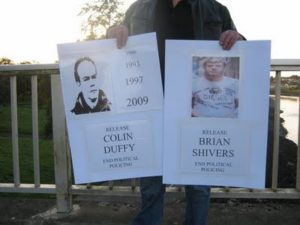Il tentativo di interruzione del caso contro due uomini accusati dell’attacco omicida di Massereene Barracks è stato respinto dal giudice

ColinDuffy, 43 anni di Lurgan, e Brian Shivers, 45 anni di Magherafelt, negano di aver ucciso i genieri Patrick Azimkar e Mark Quinsey il 7 marzo 2009.
Entrambi negano le sei accuse di tentato omicidio e il possesso delle armi da fuoco utilizzate nell’attacco a Massereene Barracks ad Antrim.
I due soldati furono colpiti a morte mentre ritiravano delle pizze fuori dai cancelli della caserma. Altri due soldati e due civili sono rimasti feriti nell’attacco.
In una precedente udienza, gli avvocati di Duffy e Shivers hanno detto che le accuse contro di loro erano tali che “nessuna giuria ragionevole adeguatamente diretta” avrebbe potuto condannarli.
Il DNA di Duffy fu ritrovato nel dito di un guanto di lattice e sulla chiusura della ciintura di sicurezza della Vauxhall Cavalier utilizzata nell’attacco.
Il DNA di Shivers fu scoperto su due fiammiferi presenti nella vettura parzialmente incendiata, ritrovata in Ranaghan Road a Randalstown, a quasi 10 chilometri dal luogo dell’omicidio.
I legali dei due repubblicani affermano che non è possibile datare quando sia stato “depositato” il DNA sugli elementi di prova o come è giunto fin nell’auto, richiamando come non porti necessariamente al loro coinvolgimento nell’attacco.
Venerdì il giudice McLaughlin ha parlato di “elementi chiave” nel caso contro entrambi gli imputati legati alla dipendenza da evidenze scientifiche e alle conseguenze da trarre da esse, aggiungendo che in questa fase “non è appropriato effettuare una dettagliata analisi di queste prove”.
Ha detto che è stato anche importante tenere a mente che il “peso pieno e gli effetti” delle prove non potevano che essere visti nel contesto generale dei fatti e delle circostanze in cui sono state trovate.
“Sono soddisfatto che l’approccio corretto da adottare sia quello di permettere a questi casi di andare in giudizio, in modo che il processo di esame dettagliato possa essere completato”, ha detto il giudice.
Nel respingere la domanda, ha detto la valutazione delle osservazioni sarebbe “in effetti indistinguibile dal processo”.
Il giudice McLaughlin ha detto alla corte: “Come ognuno degli elementi di prova, in particolare quelli del DNA, rientrino nel quadro complessivo non può essere determinato in questa fase preliminare.”
Duffy è stato rimandato in custodia mentre Shivers è stato rilasciato su cauzione continua. Il caso continua il prossimo venerdì.
Tratto da Utv
Massereene murder trial to go ahead
An attempt to have the case against two men accused of murdering two soldiers at Massereene Army base dropped has been refused by a judge.
Delivering his ruling at Belfast Crown Court, Mr Justice McLaughlin said that taking the Crown evidence at its height, “the prosecution case…justifies putting the defendants on trial on all counts”.
Colin Duffy, who is 43 and from Forest Glade in Lurgan and 45-year-old Brian Shivers from Sperrin Mews in Magherafelt, both deny murdering Sappers Patrick Azimkar and Mark Quinsey on 7 March 2009.
Both men also deny six charges of attempted murder and possessing the firearms used in the attack at Massereene Barracks in Antrim.
The two soldiers were killed in a hail of automatic gunfire while two other soldiers and two civilians were injured after a pizza had been delivered to the barracks.
At an earlier hearing, lawyers for Duffy and Shivers had argued that the evidence against them, taken at its best, was such that “no reasonable jury properly directed” could convict them.
Duffy’s DNA profile was found on the tip of a latex glove in the passenger footwell and on the passenger seat belt buckle of the Vauxhall Cavalier car used in the attack.
A DNA profile matching Shivers’ was uncovered on two match sticks in the car where it was partially burnt out on the Ranaghan Road in Randalstown, around seven miles from the scene of the fatal shooting.
Lawyers argued that it was not possible to date when the DNA was put there or even how it got there, submitting that it did not necessarily point to their involvement in the attack.
On Friday, Mr Justice McLaughlin said “key features” in the case against both defendants related to the reliance on the scientific evidence and any inferences to be drawn from it, adding that at this stage “it is inappropriate to to carry out a detailed analysis of this evidence”.
He said it was also important to bear in mind that the “full weight and effect” of the evidence could only been seen in the overall context of the facts and circumstances in which it is found”.
“I am satisfied that the proper approach to adopt here is to allow these cases each to go to trial so that the process of detailed scrutiny may be completed,” said the judge.
In refusing the application, he said that to evaluate the submissions would be “in effect indistinguishable from the trial process”.
Mr Justice McLaughlin told the court: “How each of the elements of evidence, particularly the strands of DNA evidence, fit into that overall picture cannot be determined at this preliminary stage.”
Duffy was remanded back into custody with Shivers released on continuing bail and the case was listed for mention next Friday.